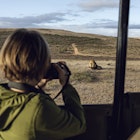

What colour is polar bear hair? Lamberrto / Shutterstock
How long is a chameleon’s tongue? How high can a flea jump? Which animal always gives birth to quadruplets? The natural world is full of incredible creatures – many of which inspire curiosity in kids. Learn as a family and get set to impress your friends with these fun facts about animals from around the world.
Impressive animal facts
1. A polar bear’s hair is not white – it’s colourless. Each thick strand of hair is hollow and reflects the light, making the polar bear appear white. Beneath this transparent fur, the skin is black, to soak up any warmth from the sun and keep the bear as warm as possible.
2. A giraffe has seven bones in its neck, which is the same as a human has, but they are much larger.
- placement: fullWidth
- path: articles/in-content-top
- possible size: [970, 250], [970, 90], [728, 90], [300, 250], [320, 50], [1, 1],
- targeting:
{ "url": "amazing-animal-facts-for-kids" }
3. The pattern of wrinkles on a gorilla’s nose is unique to each one and is known as a ‘nose print’. Conservation workers use photos and sketches of gorillas’ noses to keep track of individuals.
4. There are no male or female earthworms. All earthworms have both male and female parts – but it still takes two of them to reproduce.
5. A vampire bat’s teeth are so sharp that its bite may not be felt at all. Their saliva dulls any pain, so a bat may drink its victim’s blood for up to 30 minutes.
6. Hippos’ closest living relatives are the aquatic mammals: whales, dolphins and porpoises.
7. A chameleon’s tongue is at least as long as its body, but it can grab prey in a fraction of a second.

Can you believe it?
8. Huskies can run at speeds of around 31km per hour (20mph), but their key skill is endurance.
9. An eagle’s eyes are at least four times sharper than a human’s.
- placement: fullWidth
- path: articles/in-content-middle
- possible size: [970, 250], [970, 90], [728, 90], [300, 250], [320, 50], [1, 1],
- targeting:
{ "url": "amazing-animal-facts-for-kids" }
10. If a starfish is split into five pieces, so long as each piece contains part of the central disc, then five starfish will survive.
11. Adult bison are the largest land mammals in North America.
12. To hover, hummingbirds may beat their wings up to 200 times per second.
13. Pregnant nine-banded armadillos always give birth to four identical babies.
14. A jaguar can see in the dark six times better than a human.
Guess what!
15. While they grow, reindeer antlers have a velvety covering. When the antlers are fully grown, the ‘velvet’ is shed and rubs away.
16. Giant tortoise from the Galápagos Islands near Ecuador can weigh up to 250kg (550lbs) – the same as a brown bear!
17. The familiar ‘twit-twoo’ sound of the tawny owl comes from a male and female pair. The female’s main call is the ‘twit’ or ‘kewick’ sound, while the male’s reply is the loud ‘twoo’ or hooting sound.
18. Sea otters have the densest fur of any mammal: a large male has around 800 million hairs, compared to just five million on a human.
- placement: native
- path: articles/in-content-native
- possible size: [f, l],
- targeting:
{ "url": "amazing-animal-facts-for-kids" }
19. A female house fly lays batches of around 100–150 white eggs, and may lay more than 500 eggs in her lifetime of just a few days.
20. Cat fleas can jump to a height of up to 60 times their own body length.
21. The lion has the loudest roar of all the big cats. It can be heard as far as 5km (3 miles) away.
Did you know?
22. Emperor penguins can stay underwater for up to 27 minutes and dive as far as 500m deep.
23. Both male and female pigeons produce a substance called crop milk to feed their chicks. Very few birds have this rare ability, just greater flamingos, emperor penguins, pigeons and doves.
24. Humans share 98.8% of chimpanzee DNA. But even with DNA so similar, humans and chimps have around 35 million differences between them.
25. When they find a source of water, wild Bactrian (two-humped) camels will drink as much as 50 litres (88 pints). They will even drink salty water, unlike other mammals.
26. Kiwis, from New Zealand, forage at night, in the leaf litter of the forest floor. Unlike any other bird, kiwis have nostrils at the end of their long beaks.
Article first published in August 2019, and last updated in April 2020.
Get ready for a walk on the wild side through every continent on Earth! Kids can discover the animal kingdom like never before in Lonely Planet Kids’ The Animal Book, a beautiful encyclopedia featuring over 100 incredible creatures, from the grey wolf and green anaconda, to the bald eagle and emperor penguin.
- placement: fullWidth
- path: articles/bottom
- possible size: [970, 250], [970, 90], [728, 90], [300, 250], [320, 50], [1, 1],
- targeting:
{ "url": "amazing-animal-facts-for-kids" }
Explore related stories




 Wildlife & NatureHiking in New Zealand with a toddler is a lot easier than you imagine
Wildlife & NatureHiking in New Zealand with a toddler is a lot easier than you imagineFeb 24, 2020 • 6 min read

 Wildlife & NatureNature, surf & culture: 7 things to do in New Zealand’s Northland
Wildlife & NatureNature, surf & culture: 7 things to do in New Zealand’s NorthlandMay 24, 2019 • 3 min read
 ActivitiesCopy My Trip: Exploring Ecuador and the Galápagos with Elsewhere
ActivitiesCopy My Trip: Exploring Ecuador and the Galápagos with ElsewhereNov 25, 2024 • 5 min read



